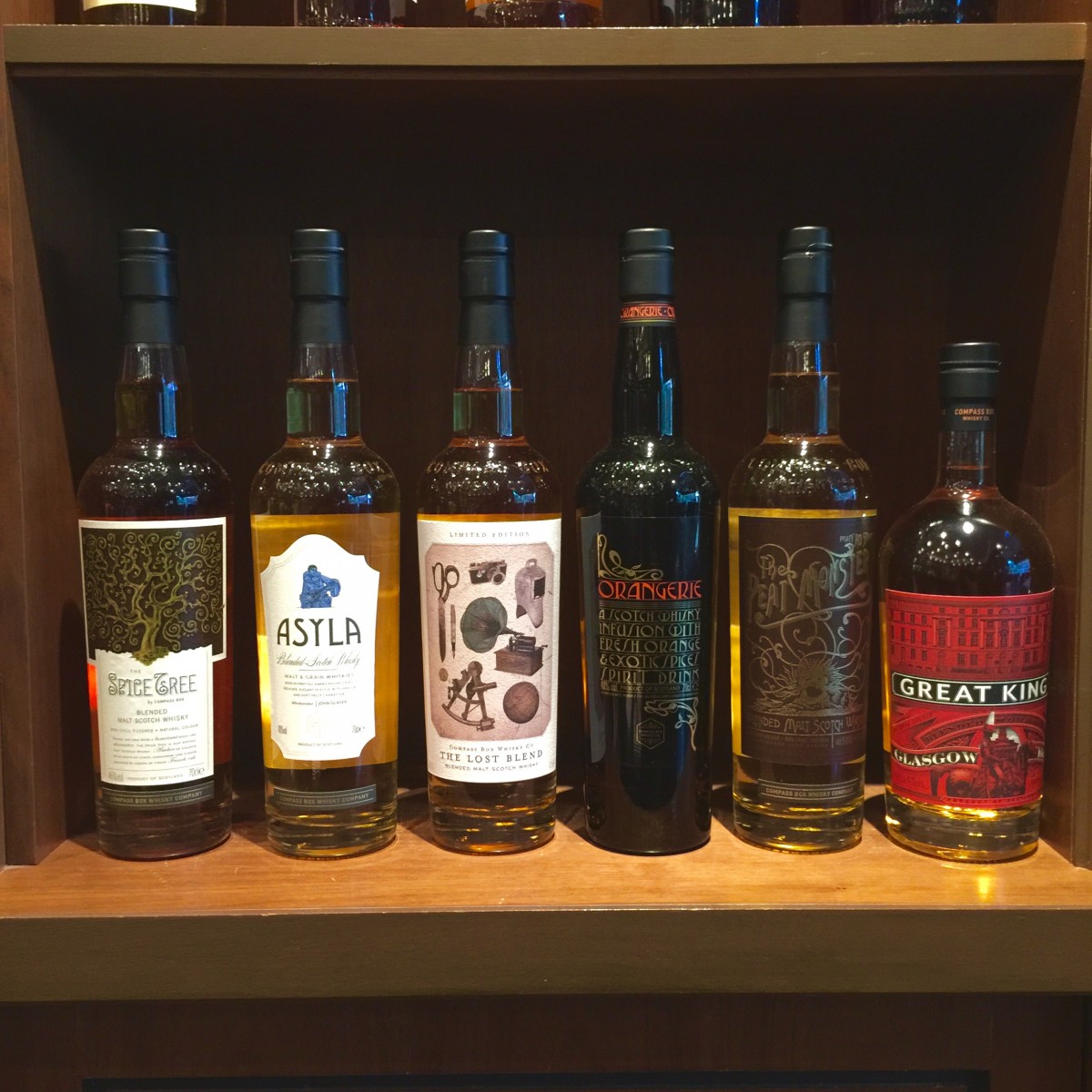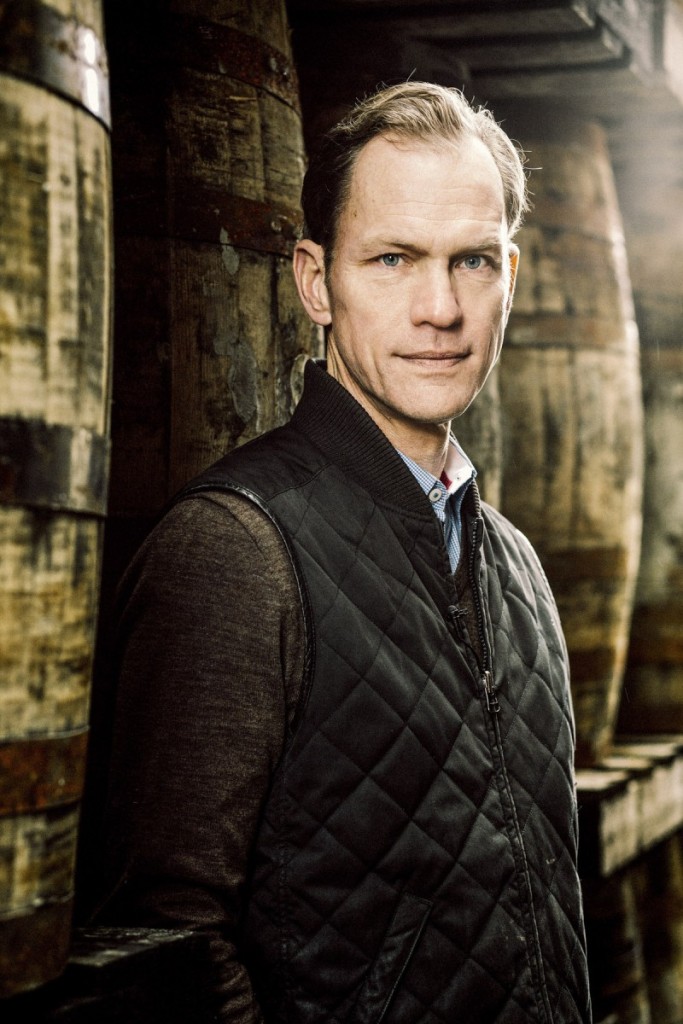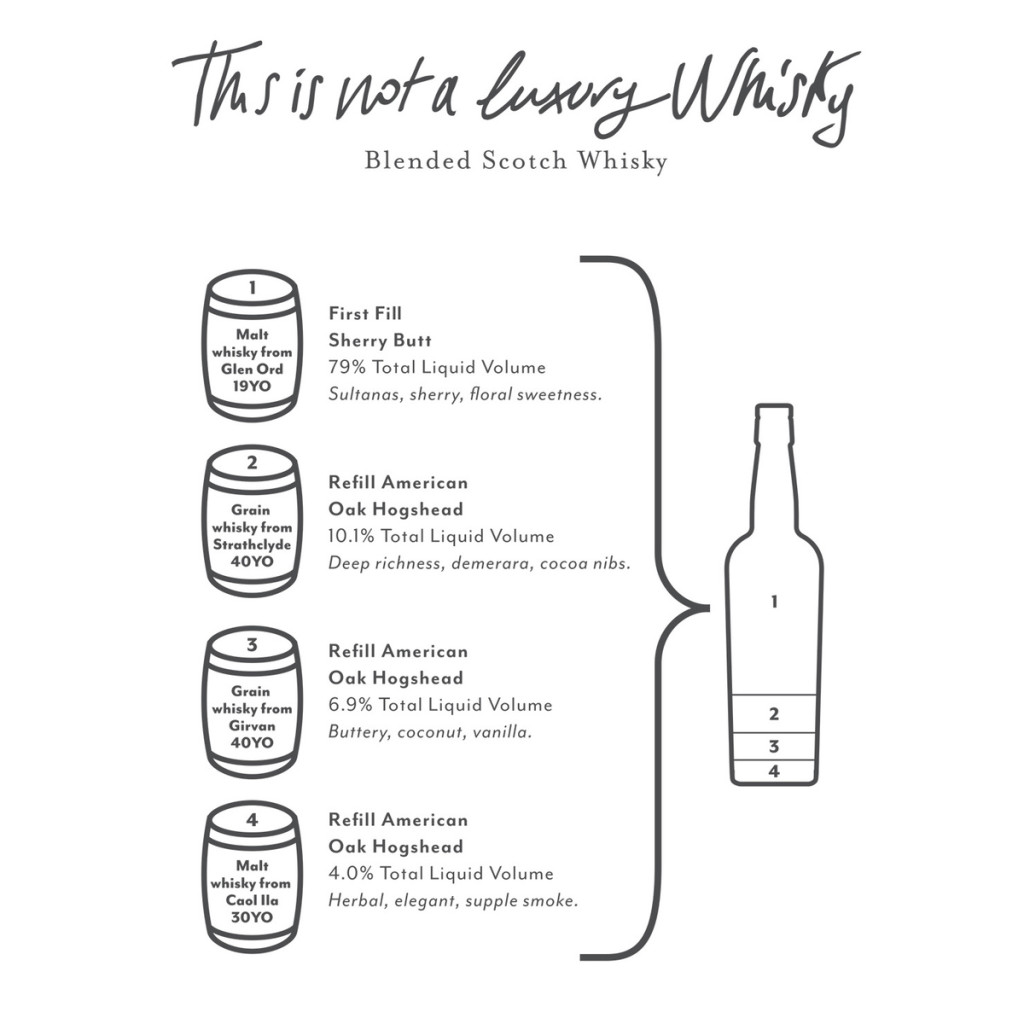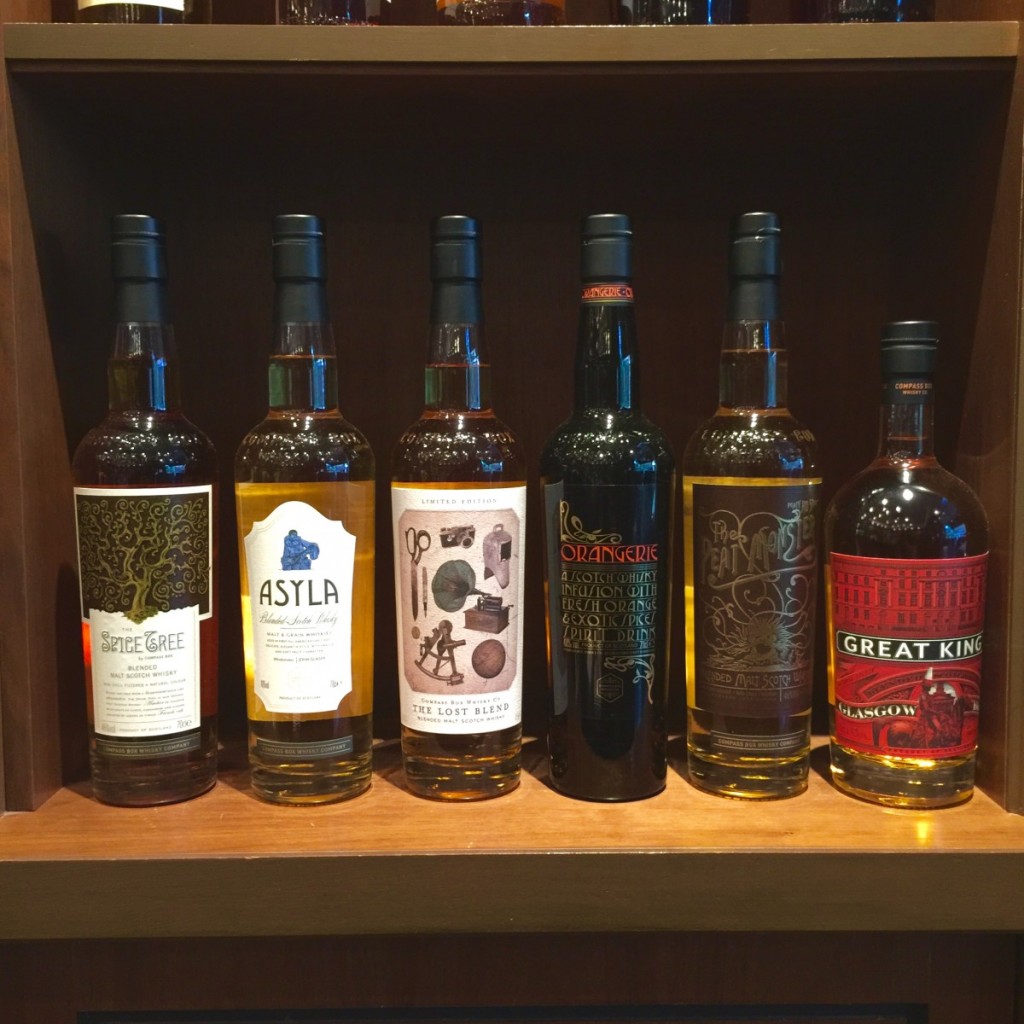
#314
BLEND ON THE RUN
25 Feb 2016 By David Fuhrmann-Lim
This man wants to disclose every malt and every ingredient in his blended whiskies. And it’s illegal.
BY MARK BYRNE
Late last year, John Glaser, the owner of Compass Box Whisky Co., decided to break the law.
More precisely, Glaser decided to continue breaking the law—and, this time, to send out a press release about it. Glaser is an American man in his 40s with a penchant for V-neck sweaters and British understatement; he has not spent time behind bars. But, for the 15th anniversary of his whisky company, which had become a cult favorite among in-the-know Scotch drinkers and a regular presence on top shelves, he had concocted a spirit he was quite proud of. He wanted to show off its ingredients.
As it happens, showing off a blended whisky’s constituent parts—the barrels that comprise the blend—is illegal under both European Union and U.K. law. Whisky producers are prohibited from listing more than one age statement—the youngest—on a label or in advertisements for a spirit. If a Scotch is a blend of both 12-year-old and 8-year-old barrels, the label can only say “8 Years Old,” a law intended to keep producers from implying a spirit spiked with old barrels is, as a whole, old.
But Glaser’s release, which he called Flaming Heart, was not simply spiked with old barrels; a 30-year-old Caol Ila whisky comprised more than a quarter of the blend. The rest was 20-year-old Clynelish and 14-year-old Caol Ila whiskies; roughly 10 percent was a 7-year-old Highland malt aged in new French oak. By law, “7” was the only age he could list. Since Compass Box’s inception, Glaser had been listing every constituent malt, in some way or another, on the brand’s website. For Flaming Heart, Glaser took it a step further, designing a precise breakdown of the blend, including it all in a press release, and shipping the Scotch far and wide.
Glaser’s act of defiance set in motion a series of heated discussions within the whisky community—was he taking a stand or being pointlessly defiant?—which culminated this week in a formal campaign intended to spark a change in the laws. At stake, according to Glaser, is not simply a blender’s pride of craftsmanship; it’s the transparency of food products at large.
The partner Glaser will likely need in his eventual mission to change the law is the Scotch Whisky Association, an organization intended to act as a lobbying advocate for distilleries and blenders. And the group is not on board: The SWA isn’t sure the law needs to be changed and (though it won’t say this outright) has little interest in going through the work of lobbying for it, with Glaser or on behalf of him. It’s as if Tesla wanted to add a new seat-belt regulation and the American auto lobby said, “We’re not going to help with that unless we absolutely have to, and right now we don’t have to.”
The issue is complicated by the fact that no government office has contacted Glaser—not the EU, not the U.K.—and he has not been fined in any way for his violation. The sole policeman of the law, so far, is the SWA itself, which contacted him after it reported receiving a complaint from another distiller.“We’ve been disclosing the ages of all the whiskies in our recipes, in various forms—in writing, on our website—ever since we started the company,” says Glaser. This was an obscure law among thousands of others, and no one had ever pointed out that Compass Box was in violation. Glaser himself was unaware until 2008, when he noticed the line about age statements in an updated version of regulating guidelines being pushed through Parliament by the SWA.
“I had to read it several times,” says Glaser. “I showed it to friends and said, ‘Is this really what I’m reading? Is this true?’” According to the rule, every whisky bottling Glaser had ever released had in some way been in violation, simply for listing the ages of each barrel. “We quietly decided that we were just going to continue to do what we had always done, in the belief that full disclosure cannot possibly be a bad thing.”
By this point, Glaser had already run afoul of the SWA twice: first, for a release in 2005 that used oak staves to mature a whisky (Scotch cannot be matured by oak that is not barrel-shaped; Glaser says the SWA threatened to take Compass Box to court); and, three years later, for Glaser’s vocal resistance to an SWA campaign to reclassify Scotch whisky under five new categories. (Glaser thought buyers sufficiently understood the preexisting category “blended Scotch”; the SWA argued that greater clarity could be found by creating new stand-alone categories for Blended Grain whisky and Blended Malt whisky.) The new Scotch categories were approved by Parliament with the rewritten guidelines, in 2009, and Glaser had established himself as a loud, often dissenting voice.

The Complaint
In October of last year, as Glaser released Flaming Heart (as well as a bottling named This Is Not a Luxury Whisky, which had the same prohibited breakdown of its blend), Magus Cormack, the SWA’s director of legal affairs, reached out to Glaser to inform him that his new products were in violation of the rules.
Cormack says a complaint about Compass Box’s bottling was submitted to the SWA from another distillery. (The SWA would not reveal the source of the complaint.) Though there is no formal method for one distillery to complain about another, playing mediator in these situations is a regular role for the organization. “Both members and nonmembers, as well as the general public, raise instances of alleged noncompliance with us,” says Cormack. Complaints and accusations of noncompliance come in weekly.
International Inertia
The SWA is under pressure to uphold the laws as they are; lobbying the U.K. government and coordinating with it on the passage of laws in Parliament, as it did in 2008, is a time-intensive process. According to Cormack, to make the legal change proposed by Glaser, the SWA would need to lobby not just Parliament but the 27 EU member states, and potentially the U.S. as well. Cormack insists that the SWA would get behind another law-change initiative like the age-disclosure issue if the majority of its members are in favor of it, but the group would not take up the mantle for anything less than a total groundswell.
“The SWA has limited resources, and many calls on those resources,” says Cormack. “It would be for the Council of the SWA to decide whether a matter such as this was of sufficient priority to devote resources to it, and I cannot predict what view would be taken.” In other words, the SWA has open ears, but to acquiesce to calls for change would be to assign itself a very large workload. (With respect to Glaser’s previous run-ins with the organization, Cormack only says, “We are not concerned with events 11 years ago, and indeed have invited Compass Box to join the SWA. To date we have not received any response.”)
Glaser’s Petition
This week, in an effort to make sure the SWA’s open ears are ringing with calls for change, Glaser and his team are going wide with the fight. His hope is that a bigger stage for the conversation will create the kind of groundswell Cormack and the SWA cannot ignore. This includes a consumer-targeted campaign at compassboxwhisky.com where drinkers can read Glaser’s “Statement of Beliefs” and sign a letter of support for his petition. The goal: to align Compass Box’s age-statement pride with a larger shift toward transparency in food. Call it the Whole Foods Mindset: Consumers want to know more about what they’re eating—and drinking. Glaser’s pitch to consumers is that, when it comes to Scotch, only a law change can make that possible.
From the perspective of Cormack and the SWA, Compass Box’s proposed change would have the opposite effect: It would allow Scotch producers a better way to mislead consumers. “Given the difficulty, in legislation, of providing for every conceivable way of referring to the age of a spirit on labels and in advertising, the legislature in both the EU and the U.S. apparently concluded that the best way of protecting the consumer from misleading age claims was to stipulate that only the youngest whisky in a blend could be referred to,” says Cormack.

Compass Box has an extraordinary range of blends.
Meanwhile, Glaser’s pitch to his fellow distillers and blenders has been much more elemental. “The risk, at the end of the day, is a commercial risk to the sales of Scotch whisky,” he says. “That might sound preposterous to some people in Scotch whisky because it’s such a behemoth.” (Scotch whisky is by far the best-selling type of whisky, by about triple its closest competitor; 99 million cases were exported worldwide in 2014.) “But things change. Look at the American beer industry. There’s a lot of countries, a lot of companies, a lot of individuals that are thinking differently about whisky making. Scotch whisky needs to be aware of that and think differently moving forward.”
Compass Box has been working the phones since September, and, according to Glaser, has yet to find a Scotch producer resistant to a change in the labeling regulations. “No one at Compass Box has talked to a company so far that would prefer the law stay the same,” says Glaser. “There could be those companies out there, but we haven’t encountered them yet.” Other major liquor companies declined to comment for this article.
Still, Glaser knows that if he wants to enact real change, he can’t be viewed as just a rabble-rouser. “We want to do this the right way,” he says. “And the wrong way to do it would be to behave in such a way that makes the Scotch Whisky Association, for whatever reason, less inclined to take this forward.”
Read it at Bloomberg Pursuits

You might be interested in...
DRINK HERE: THE SWAN SONG
9 Reasons Why You Should Say 'Hello' to The Swan Song – Our Favourite New Whisky Bar.
ONE STEP BEYOND
Bragging Rights: The Macallan's Quest Collection is Available Only in Travel Retail, and Right Now Only Available in Singapore in January Before It's Released to the Rest of the World.
11 THINGS YOU SHOULD KNOW ABOUT SPRINGBANK
Springbank goes together with Campbeltown like Taylor Swift and breakup songs. Read on.
DRINK HERE: THE SWAN SONG
ONE STEP BEYOND
11 THINGS YOU SHOULD KNOW ABOUT SPRINGBANK